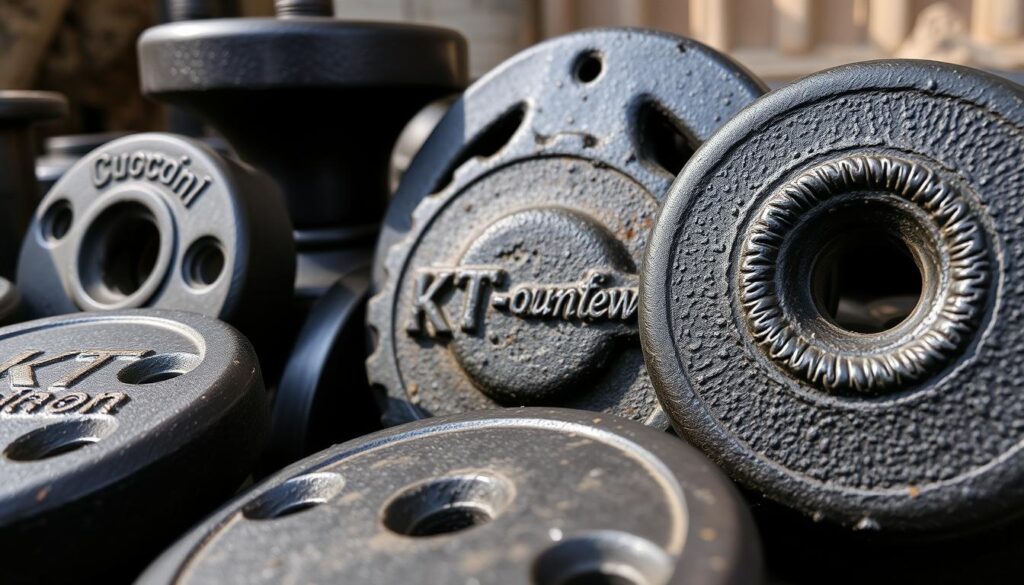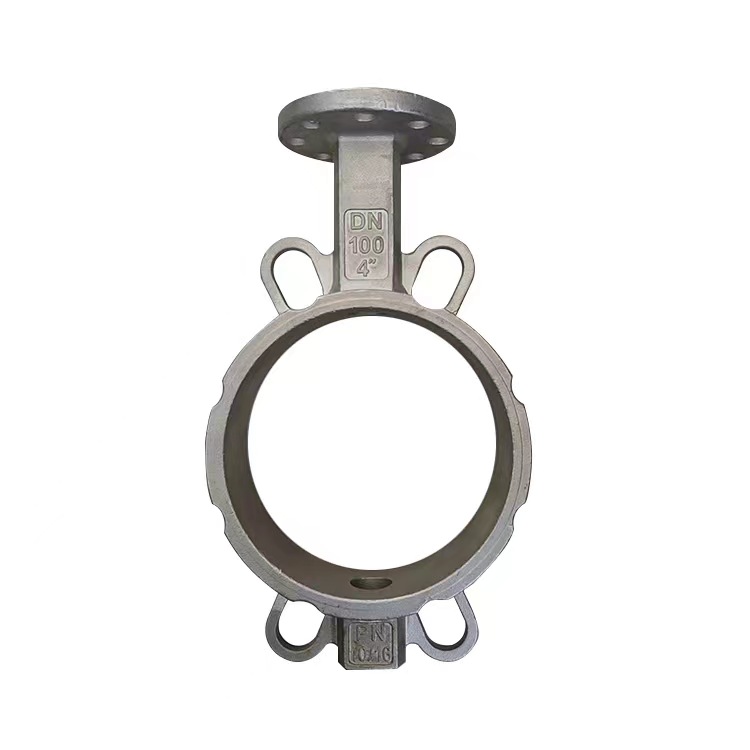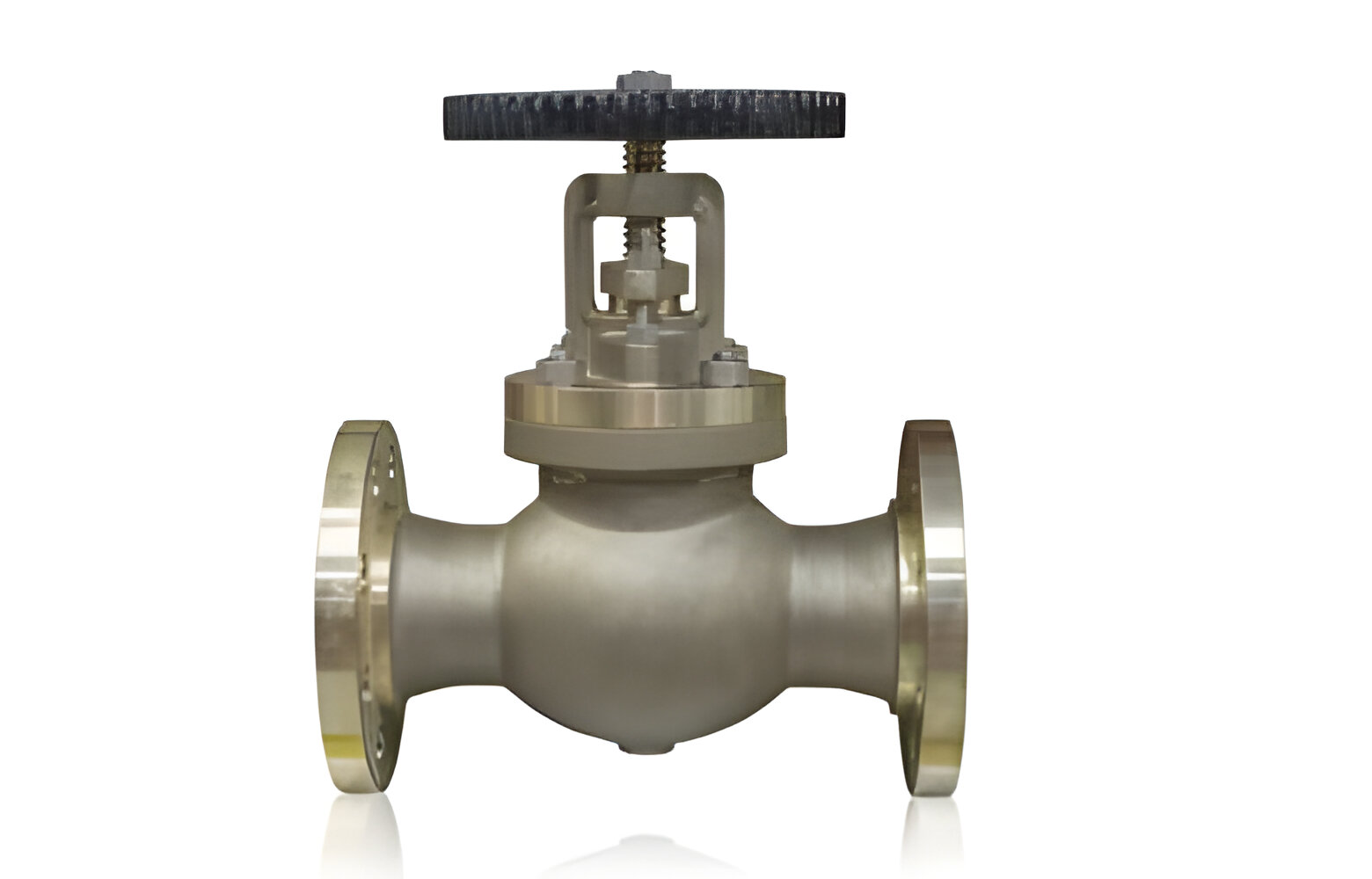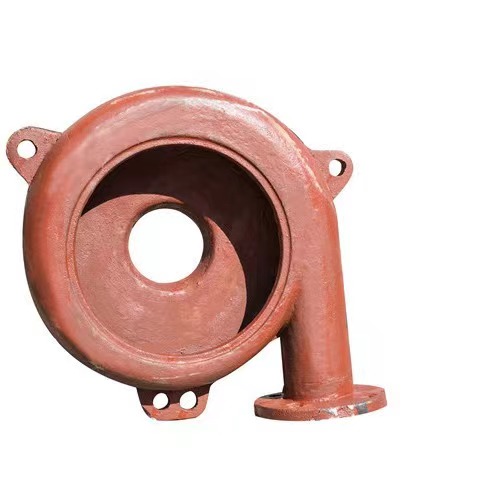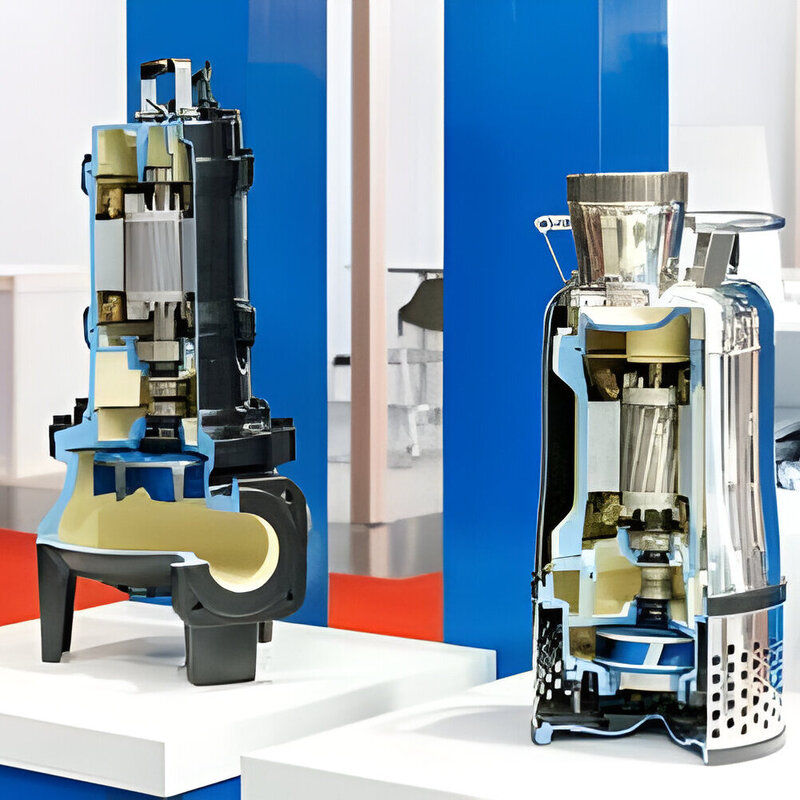Did you know that the secret to off-highway equipment's top performance lies in their counterweights? Cast iron, often overlooked, is the best choice for these parts. Let's explore the world of cast iron counterweights, from design to use in various industries.
Key Takeaways
- Cast iron counterweights are three times denser than concrete, making them more compact and efficient.
- Precision machining is key to meet the strict standards of off-highway equipment makers.
- FMGC, a top European maker, offers cast iron counterweights from 1 to 15 tons.
- Cast iron's strength and impact resistance mean they last longer than concrete counterweights.
- Using recycled cast iron counterweights is good for the environment and supports sustainability.
The Importance of Counterweights in Heavy Machinery
Counterweights are key for keeping heavy machinery stable and balanced. This includes mobile cranes, excavators, telehandlers, and wheel loaders. They are vital for the machines to work well and safely.
Ensuring Stability and Balance
Counterweights keep heavy machinery balanced. They are placed at the back to balance the weight of the load or the force during tasks. This balance is crucial to prevent the machine from tipping over.
Such a tip could cause serious damage and is a big safety risk.
The Role of Counterweights in Chassis Configuration
The design of heavy machinery's chassis is shaped by counterweights. Operators can change the counterweights to fit different lifting needs. This makes the equipment work better and safer for various tasks.
Counterweights are essential for the design and use of heavy machinery. They ensure the machines are stable, balanced, and efficient. Knowing their importance helps manufacturers and operators improve their equipment's performance and safety.
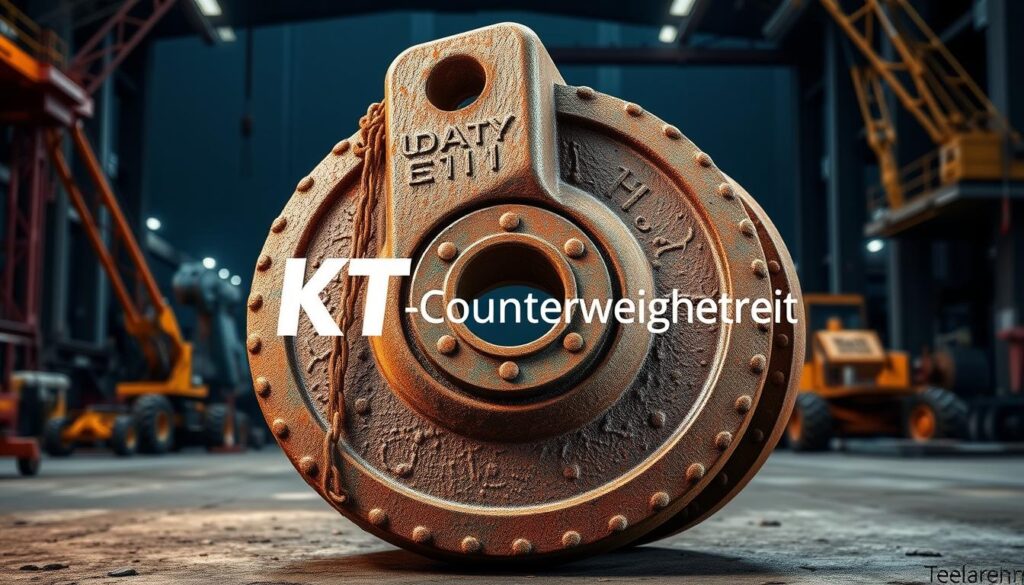
Why Choose Cast Iron for Counterweights?
Cast iron is the top pick for making counterweights for heavy machinery. It has great mechanical properties. This makes it better than concrete for many industries.
Density Advantages of Cast Iron
Cast iron has a high density. This means it can be more compact and save space. It also costs less because you need less material to get the right weight.
Cost-Effectiveness Compared to Concrete
Concrete can be made denser with special additives like limonite, hematite, or magnetite. But this makes it more expensive. Cast iron is cheaper and still strong without extra additives.
Durability and Resistance to Impact
Cast iron is very hard and can take a lot of impact. It lasts longer than concrete in tough conditions. This means it can handle heavy use better.
"Cast iron counterweights offer a higher density, superior strength, and greater cost-effectiveness compared to concrete, making them the preferred choice for a wide range of heavy machinery applications."
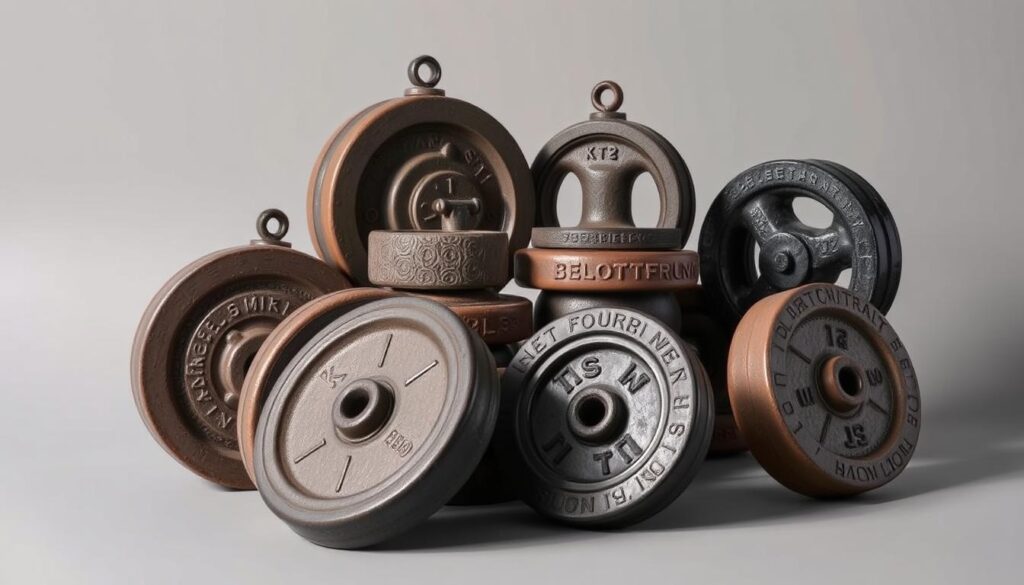
Using cast iron for counterweights means better performance and cost savings. This boosts the efficiency and productivity of heavy machinery.
Cast Iron Counterweight: Design and Manufacturing
Making a top-notch cast iron counterweight is a detailed process. Every step is crucial for the product's final quality and efficiency. At the core of this process is the green sand casting method. It's a favorite among manufacturers for its many benefits.
The Casting Process: Green Sand Casting
Green sand casting is a cost-effective and flexible method. It's great for making cast iron counterweights because it allows for many mold and pattern options. This eco-friendly method uses a mix of sand, clay, and additives to create detailed molds. It ensures a precise and consistent product.
This method's flexibility helps meet the changing needs of counterweights for off-highway equipment. This includes cranes, excavators, elevators, and lift systems.
Precision Machining for Complex Shapes
Precision machining is key in making cast iron counterweights. Investing in the latest machinery and tools is vital. This ensures counterweights meet the complex engineering demands of the industry.
Our skilled machinists use advanced techniques. They achieve tolerances from a millimeter to one hundredth of a millimeter. This ensures the counterweights fit perfectly with the equipment and perform well.
| Metric | Value |
|---|---|
| Company Experience | 15+ years |
| Company Employees | 1,000+ |
| Regional Sales Distribution |
|
| Delivery Terms | FOB, CFR, CIF, EXW, DDP, DDU, Express |
| Payment Currencies | USD, EUR, JPY, CAD, AUD, HKD, GBP, CHF |
| Payment Types | T/T, L/C, MoneyGram, Credit Card, PayPal, Western Union, Cash |
| Languages Spoken | English, Chinese, Spanish |
By combining green sand casting with precision machining, we guarantee top-quality cast iron counterweights. They meet the growing needs of the off-highway equipment industry with exceptional quality, performance, and reliability.
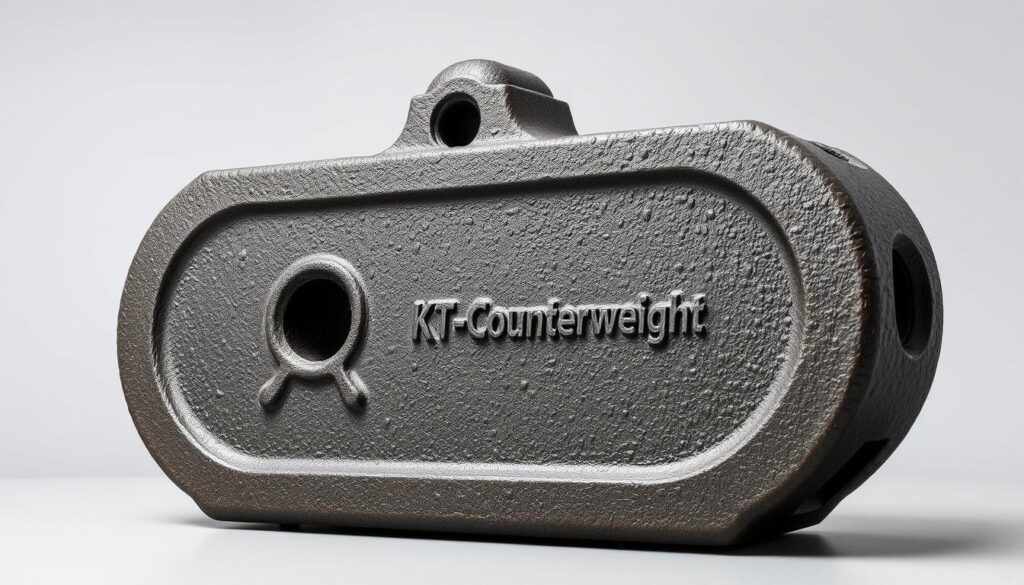
Applications of Cast Iron Counterweights
Cast iron counterweights are key in many heavy machines and equipment. They improve performance, stability, and efficiency. These parts are vital in industries like construction and machinery.
Off-Highway Vehicles: Cranes, Excavators, and More
In construction and machinery, cast iron counterweights are crucial. They are used in mobile cranes, excavators, and more. These counterweights help keep vehicles stable and balanced, making them handle heavy loads well.
Elevators and Lift Systems
Cast iron counterweights are also important in elevator and lift systems. They balance the system, saving energy and ensuring safe operation. This makes these systems reliable and cost-effective.
For both off-highway vehicles and elevators, cast iron counterweights from KT-Foundry are top-notch. They offer durability, strength, and performance. These counterweights are built to last, ensuring reliability and longevity.
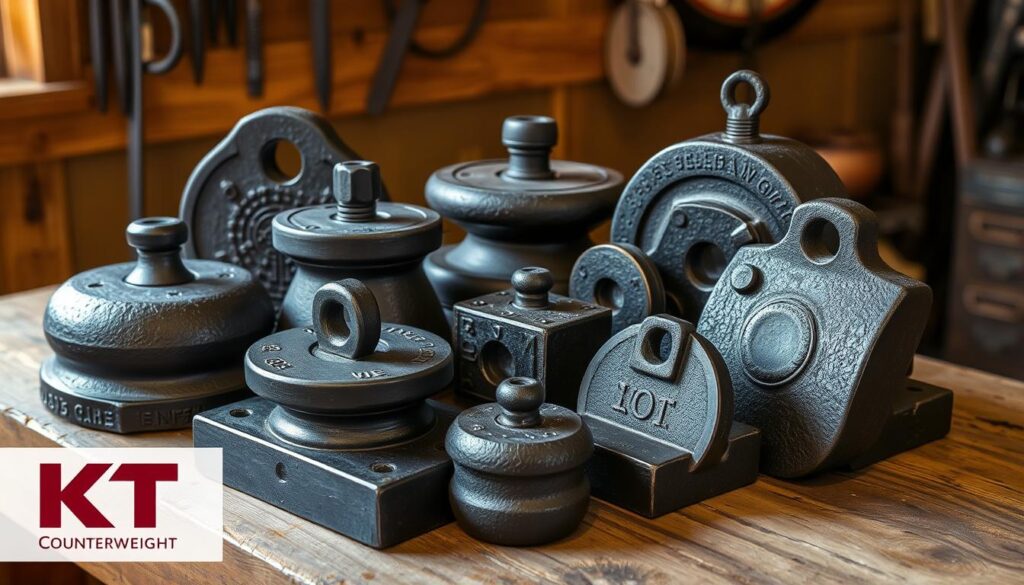
"Cast iron counterweights are the backbone of many heavy-duty machines and systems, ensuring their stability, efficiency, and safety. Their unmatched strength and durability make them an indispensable component in construction, mining, and transportation industries."
Advantages of Cast Iron Counterweights
Choosing the right counterweights for heavy machinery is key. Cast iron counterweights stand out because they improve performance, efficiency, and are better for the environment. They are a top pick for many uses.
Space and Volume Efficiency
Cast iron counterweights are denser than concrete. They pack more weight in less space. This means you need less material, saving money and making your equipment more compact.
Environmental Friendliness: A Product of Recycling
Cast iron counterweights are made from recycled materials. This makes them a green choice. They help reduce waste and save natural resources, making them better for the planet.
Cast iron counterweights are great for heavy machinery. They save space and are eco-friendly. These benefits help manufacturers design better, save money, and support sustainable practices.
Cast Iron Counterweight
Customization and Collaboration with Clients
At KT-FOUNDRY, we know that a good counterweight project starts with teamwork. We spend a lot of time with our clients to get things right. This helps build trust and makes sure the product fits their needs perfectly.
Our team talks with customers to learn what they want and any problems they might have. This way, we can make sure our counterweights are just what they need.
Range of Weights and Shapes Available
We make all sorts of cast iron counterweights for off-highway equipment. Our weights can be as small as 1 ton or as big as 15 tons. This range helps us meet the needs of many different industries.
We can also make different shapes to fit what our clients need. Our foundry is great at making all sorts of shapes and designs. This means we can make counterweights that fit perfectly with our clients' equipment.
We focus on making our products easy to use and install. This helps us keep up with the changing needs of the market. By listening to our clients, we can always provide top-notch cast iron counterweight solutions. These solutions improve the performance and stability of their equipment.
"KT-FOUNDRY's expertise in customization and their collaborative approach have been instrumental in the success of our projects. Their diverse range of cast iron counterweights has allowed us to find the perfect solution for our unique requirements."
| Counterweight Weight | Counterweight Shape | Common Applications |
|---|---|---|
| 1 ton to 15+ tons | Rectangular, Cylindrical, Customized | Cranes, Excavators, Forklifts, Elevators |
Choosing the Right Counterweight for Your Application
When picking a counterweight for your machinery, several factors are important. The weight, material, and the industry it's for all matter. They help make sure your equipment works well and stays stable.
Weight Considerations
Counterweights vary in weight, from 1 kg to 50 tons. The weight needed depends on your machine's size and lifting power. It's key to pick the right weight to balance and stabilize your machine.
Material Matters
The material of the counterweight affects its use. Cast iron is good for the marine industry because it doesn't rust easily. For farming equipment, ductile iron and steel are better. They are stronger and more flexible than cast iron.
Industry-Specific Considerations
The type of industry matters too. Heavy counterweights are needed for off-highway vehicles like cranes and excavators. They need to be stable when lifting and moving. For construction and farming, the counterweight must fit the machine and its work area well.
By looking at weight, material, and industry needs, you can pick the right counterweight. This ensures your machine works well and safely.
| Counterweight Characteristics | Cast Iron | Concrete |
|---|---|---|
| Density | Higher (around 3 times more than concrete) | Lower |
| Cost | More cost-effective than steel | Can be more expensive depending on density requirements |
| Strength and Durability | Superior strength and fatigue resistance | Less durable and prone to cracking under stress |
| Corrosion Resistance | Highly resistant to corrosion | Susceptible to corrosion in certain environments |
| Formability | Easily shaped into a variety of forms | Limited in shaping capabilities, more expensive to carve |
"Cast iron counterweights are essential components that ensure the safe and efficient operation of machines, making them a preferred choice across industries for stability and performance."
Conclusion
Cast iron counterweights are key for heavy machinery, providing stability and balance. They are used in many areas, like off-highway vehicles and elevators. Their high density, cost-effectiveness, and durability make them the top choice.
Companies like KT-FOUNDRY specialize in making custom cast iron counterweights. They use advanced methods to create a wide variety of weights and shapes. This ensures the perfect counterweight for any need.
The importance of cast iron counterweights will grow as we improve heavy machinery. Working closely with clients and using the latest in materials and manufacturing, we're ready. We aim to provide reliable, efficient, and affordable counterweights for our industry's success.

